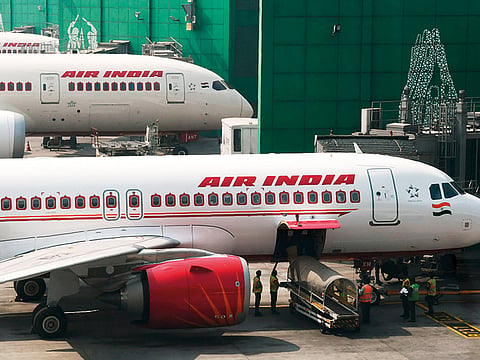India flight ban: Will government rescue airlines with a US-style bailout package?
Latest suspension of services will even put Indian economy at risk

Also In This Package
Dubai: The latest ban on commercial flights from India will further dent recovery prospects for the country’s airlines, still reeling from the devastation of last year.
“Prior to the pandemic, India’s air travel industry was vulnerable - despite it having a huge market and all of its major airports being in expansion mode,” said John Boyd, founder of the aviation consultancy Boyd Company. “Most airlines were short on cash and suffered with weak balance-sheets.”
Then came COVID-19, with India immediately grounding most of its airline services, international and domestic. Only Air India was allowed to operate, as part of the ‘Vande Bharat’ repatriation mission for Indians stuck abroad when lockdowns hit.
Now, with a second infection wave sweeping the country and countries suspending flights from India, a fresh crisis is brewing for airlines.
Several of them took the opportunity to launch routes to new markets – but all this may be coming to an end now. Vistara, a joint venture between India’s Tata Group and Singapore Airlines - with its business model focused so heavily on serving London’s Heathrow Airport – will be especially hurt by this latest round of travel restrictions, added Boyd.
Expanding fleet
Low-cost carrier SpiceJet had signed an agreement with Avenue Capital Group in the US for the sale and lease-back of 50 new planes to be ordered by the airline. “This alliance will ensure a seamless induction of the planes in our fleet and help us plan better for the long term,” said Ajay Singh, Chairman and Managing Director, SpiceJet, in a statement last month.
The carrier also introduced flights to several Gulf destinations, including the UAE. Apart from operating several direct flights to Ras Al Khaimah, which serves as a regional base for the carrier, Spicejet also has flights that connect UAE passengers to multiple Indian cities via Delhi.
The 10-day suspension of flights from India will surely hit passenger numbers on these routes.
Bailout hopes
Will the latest suspension of services force the Indian government to come up with a bailout package for the airline industry? Or will that be less of a priority as other sectors demand renewed attention?
India was one of the exceptions when it came to offering state support for airlines after the first COVID-19 wave. But some remain hopeful some aid will be there this time round.
“There is some hope among business leaders in India that this latest round of restrictions will create momentum for a US-style airline bailout package – which thus far India has been reluctant to do,” said Boyd. “This would certainly be welcome news to carriers like Indigo, Vistara and SpiceJet.”
Direct hit
There’s something more at stake in this sudden disruption of air connectivity. “The new restrictions – from wealthy nations like US, Israel, Gulf states, UK, and Canada - are problematic for not only the Indian aviation industry but the economy at large,” said Boyd.
This prevents the flow of dealmakers and business leaders in and out of India – and puts a “damaging” global spotlight on the “uncertainty factor” in India, said Boyd. “Deals are getting stalled and the hidden costs associated with uncertainty and the continued disruption of normal business activity are severe.”
Several countries have blocked flights from India as the country continues to report a record number of daily infections. Daily cases have gone past the 300,000 mark and industry experts are doubtful that the flight bans will be lifted soon.
Recently, Kuwait's Directorate-General of Civil Aviation said it had suspended all direct commercial flights coming from India, effective April 24 and until further notice. Prior to that, UAE announced the suspension of inbound flights for national and international carriers coming from India for a period of 10 days and which can be extended.
Sign up for the Daily Briefing
Get the latest news and updates straight to your inbox









